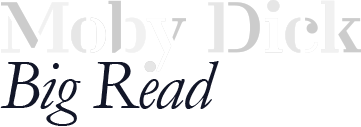The Moby-Dick Big Read has been made possible by the generosity of the readers and artists who, united by a passion for Herman Melville’s Moby-Dick, have kindly contributed their time and creativity to the project for free.
Undertaking such a leviathan of a project – sourcing, recording and editing 136 readings alongside an international body of artwork to accompany each chapter – has been made possible by the extraordinary commitment of a dedicated team of people, who for nearly two years have been united by a vision to create a new way of retelling the story of Moby-Dick for a 21st Century audience.
This project grew out of the The Arts Institute’s Whale Festival (2011) and was conceived and curated by Philip Hoare (winner of the 2009 Samuel Johnson prize for non-fiction for Leviathan or, the Whale) and the acclaimed artist, Angela Cockayne, whose exhibition, Dominion, also held at The Arts Institute’s Levinsky Gallery in 2011, provided vital inspiration.
The Moby-Dick Big Read aims to inspire and reach new readers and is part of the Plymouth International Book Festival, an annual event that celebrates and promotes literature in Plymouth and the South West. This project would not have been possible without the support of the University of Plymouth’s Marine Institute, and Bath Spa University, as well as the Leverhulme Trust which supported Philip Hoare as Artist-in-residence at the Marine Institute.
Thanks also to The Arts Institute, University of Plymouth, who alongside commissioning the project have overseen the production from initial concept to final edit; to i-DAT, the innovative research unit at University of Plymouth and a National Portfolio Organisation of Arts Council England, and Intercity, who designed and produced the website and online platforms, and to Deep Blue Sound Recording Studio, Plymouth, who generously provided their studios, expertise and time to record and edit the audio readings.
A special thanks to Peter Donaldson, who introduces each chapter.
The Moby-Dick Big Read is an entirely not-for-profit venture, but we are pleased to invite anyone who has enjoyed the readings and artworks to contribute to Whale and Dolphin Conservation, the international charity which works for the welfare of the animals about which Herman Melville wrote so eloquently, and so movingly.
To donate and find out more, visit WDC at uk.whales.org


